Conferences
🌐suivre Marie-Anne Frison-Roche sur LinkedIn
🌐s'abonner à la Newsletter MAFR. Regulation, Compliance, Law
🌐s'abonner à la Newsletter par vidéos Surplomb, par MAFR
____
► Référence complète : M.-A. Frison-Roche, "Régulation, Compliance et Gouvernance : un équilibre à expliciter pour accroître la solidité de l’espace numérique", in M-A. Frison-Roche & G. Loiseau (dir.), Durabilité de l'Internet : le rôle des opérateurs du système des noms de domaine. Compliance et régulation de l'espace numérique, Journal of Regulation & Compliance (JoRC) et Institut de Recherche Juridique de la Sorbonne (André Tunc - IRJS), Université Paris I-Panthéon-Sorbonne, 21 février 2025.
____
🧮consulter le programme complet de cette manifestation
____
► Résumé de cette conférence :
____
🎥voir aussi la présentation de l'autre intervention faite au cours de ce colloque : Contrôle de la proportionnalité entre contraintes et pouvoirs : exemple de l’impératif technique d’inclusion.
________
Thesaurus : Doctrine
Référence complète : Queinnec, Y et Constantin, A., Devoir de vigilance. Les organes de gouvernance des entreprises en première ligne, in Le Big Bang des devoirs de vigilance ESG : les nouveaux enjeux de RSE et de droit de l'homme, doss., Revue Lamy Droit des Affaires, n°104, mai 2015, p.68-74.
____
Thesaurus : Doctrine

► Full Reference: V. Magnier, "The transformation of governance and due diligence", in M.-A. Frison-Roche (ed.), Compliance Obligation, Journal of Regulation & Compliance (JoRC) and Bruylant, "Compliance & Regulation" Serie, to be published
____
📘read a general presentation of the book, Compliance Obligation, in which this article is published
____
► Summary of the article (done by the Journal of Regulation & Compliance - JoRC): The author develops the tensions caused by Compliance Law and the Duty of Vigilance on corporate governance.
The French "Sapin 2" law targets corruption, while the French "Vigilance" law has a broader scope in terms of risks and the entire value chain. It is logical that this should create tensions in terms of governance, given the monumental goals involved. Companies need to take ownership of the powers delegated to them, which means rethinking their governance and the way in which they exercise their corporate mandates, with the corporate interest, the judge's compass, having to be combined with the adoption of new standards of behaviour formalised voluntarily by ethical charters in line with international standards. On this voluntary and supervised basis, the company must adapt its structure and then contractualise these norms.
This ethical approach has an impact on the role of corporate organs, not only in terms of transparency and risk prioritisation, but also proactively in terms of the adoption of commitments whose sincerity will be verified, as reflected, for example, in corporate governance codes (cf.in France the AFEP-MEDEF Code), the setting up of ad hoc committees and the presence of stakeholders, who will be consulted when the vigilance plan is drawn up.
She stresses that this creates tensions, that dialogue is difficult, that business secrecy must be preserved, but that stakeholders must become Vigilance watchdogs, a role that should not be left to the public authorities alone.
____
🦉This article is available in full text to those registered for Professor Marie-Anne Frison-Roche's courses
________
Sept. 4, 2025
Thesaurus : Doctrine

► Full Reference: V. Magnier, "Transformation de la gouvernance et obligation de vigilance" (The transformation of governance and due diligence), in M.-A. Frison-Roche (dir.), L'Obligation de Compliance, Journal of Regulation & Compliance (JoRC) and Dalloz, coll. "Régulations & Compliance", 2024, forthcoming
____
📕read the general presentation of the book, L'Obligation de Compliance, in which this contribution is published
____
► English summary of this contribution (done by the Journal of Regulation & Compliance - JoRC) : The author develops the tensions caused by Compliance Law and the Duty of Vigilance on corporate governance.
The French "Sapin 2" law targets corruption, while the French "Vigilance" law has a broader scope in terms of risks and the entire value chain. It is logical that this should create tensions in terms of governance, given the monumental goals involved. Companies need to take ownership of the powers delegated to them, which means rethinking their governance and the way in which they exercise their corporate mandates, with the corporate interest, the judge's compass, having to be combined with the adoption of new standards of behaviour formalised voluntarily by ethical charters in line with international standards. On this voluntary and supervised basis, the company must adapt its structure and then contractualise these norms.
This ethical approach has an impact on the role of corporate organs, not only in terms of transparency and risk prioritisation, but also proactively in terms of the adoption of commitments whose sincerity will be verified, as reflected, for example, in corporate governance codes (cf.in France the AFEP-MEDEF Code), the setting up of ad hoc committees and the presence of stakeholders, who will be consulted when the vigilance plan is drawn up.
She stresses that this creates tensions, that dialogue is difficult, that business secrecy must be preserved, but that stakeholders must become Vigilance watchdogs, a role that should not be left to the public authorities alone.
____
🦉this article is available in full text pour the persons following the Professor Marie-Anne Frison-Roche teaching
________
June 25, 2025
Thesaurus : Doctrine
► Référence complète : A. Bauch, Le droit de l’entreprise à l’épreuve de la compliance, Thèse Université Toulouse Capitole 2025, 492 pages dactyl.
____
soutenue le 25 juin 2025.
🪑🪑🪑Membres du jury :
🕴🏻Lukas Rass-Masson, professeure à l'Université Toulouse-Capitole, directeur de la thèse
🕴🏻Sandrine Tisseyre, professeure à l'Université Toulouse- Capitole, rapporteure
🕴🏻Philippe Weller, professeure à l'Université d'Heidelberg, rapporteur
🕴🏻Caroline Coupet, professeure à l'Université Panthéon-Assas (Paris II)
🕴🏻Marie-Anne Frison-Roche
____
► Présentation de la thèse

June 25, 2025
Teachings : Participation à des jurys de thèses

🌐follow Marie-Anne Frison-Roche on LinkedIn
🌐subscribe to the Newsletter MAFR Regulation, Compliance, Law
🌐subscribe to the Video Newsletter MAFR Surplomb
🌐subscribe to the Newsletter MaFR Droit & Art
____
► Full Reference: M.-A. Frison-Roche, member of the jury for Annika Bauch's thesis, Le droit de l'entreprise à l'épreuve de la compliance (Company Law put to the test of Compliance), University of Toulouse, 5 June 2025, 2-5pm.
____
🪑🪑🪑Other members of the jury :
🕴🏻Lukas Rass-Masson, Professor at Toulouse-Capitole University, thesis supervisor
🕴🏻Sandrine Tisseyre, Professor at Toulouse-Capitole University,
🕴🏻Marc-Philippe Weller, Professor at the University of Heidelberg, Germany
🕴🏻Caroline Coupet, Professor at the Université Panthéon-Assas (Paris II)
____
► Presentation of the thesis: The thesis is based on French, American and German research. It is based on two perspectives.
The first part of the thesis describes the way in which Business Law feeds into Compliance, since it is within Business Law (and more particularly Company Law and the legal rules governing corporate bodies) that Compliance, which the author presented to have originated in the United States, has transformed the way in which companies must be managed, having to take into account the extra-financial dimension of their activity, which modifies the very notion of social interest and leads to the integration of stakeholders into the corporate functioning.
The second part of the thesis looks at the way in which Compliance has transformed Corporate Law, bringing with it new requirements, such as consideration of risks, regulatory mechanisms and ethical concerns, with the company itself becoming a vehicle for Compliance. This is achieved in particular by inserting compliance clauses into contracts, which is an appropriate but nevertheless limited tool for this compliance goal.
____
At the end of her defence, the candidate was awarded the degree of Doctor of Law and was informally congratulated by her jury on the quality of her work.
____
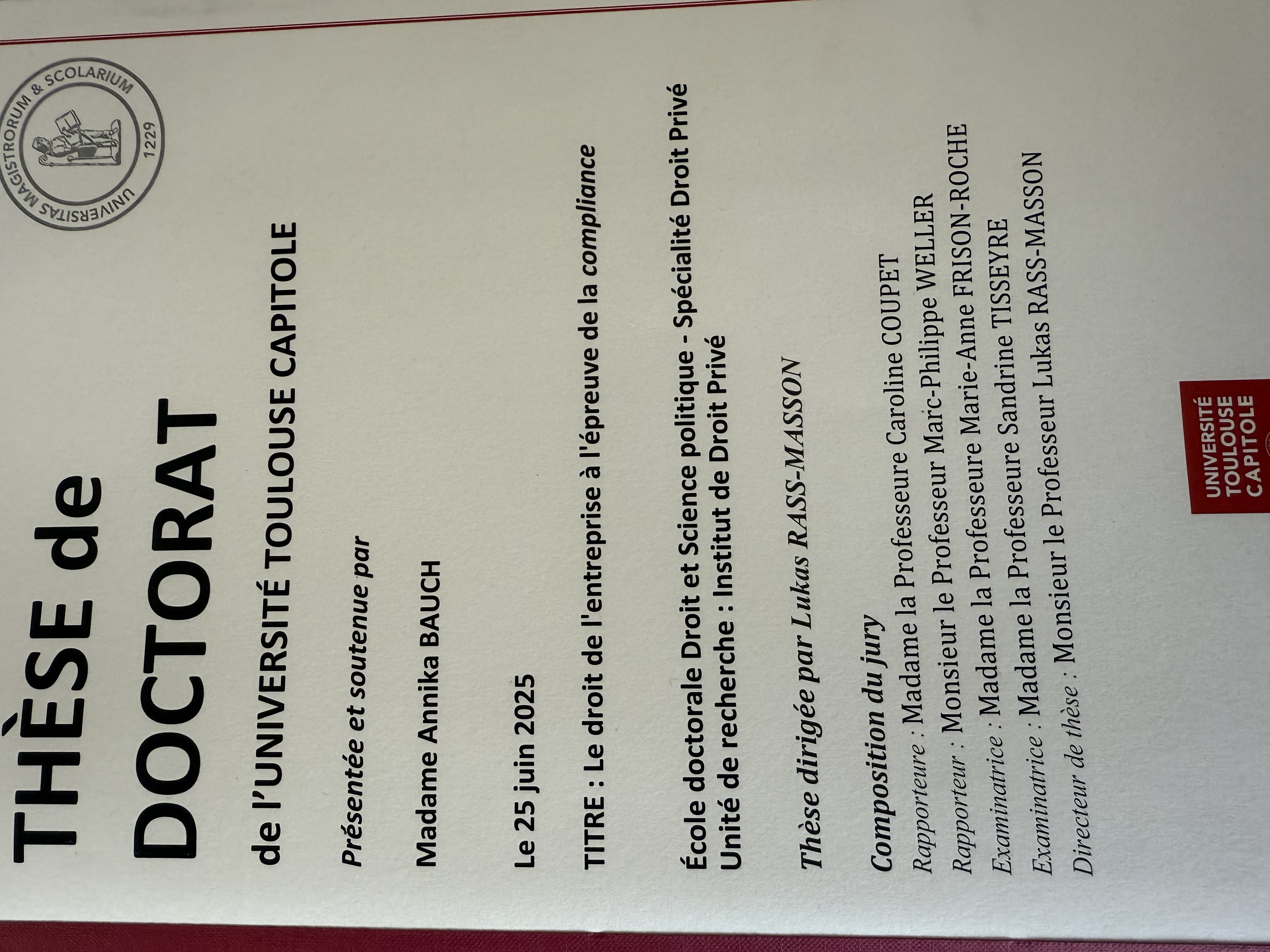
May 10, 2025
Thesaurus : Doctrine
► Référence complète : G. Beaumier & L. Gjesvik, "Digital Governance in a Rubber Band: Structural Constraints in Governing a Global Digital Economy", Global Studies Quarterly, vol. 5, issue 2.
____
____
► Résumé de l'article (fait les auteurs) : L’on représente souvent les États-Unis, l’Union européenne et la Chine comme l’incarnation de trois modèles de gouvernance numérique qui s’opposent. Leurs approches « de marché », « démocratique » et « autoritaire » refléteraient leurs préférences respectives s’agissant des acteurs qui devraient contrôler le développement et l’utilisation des technologies numériques. Nous affirmons qu’outre le fait de représenter différentes préférences, chaque modèle se distingue par la façon dont il résout les tensions inhérentes au gouvernement d’une économie numérique dans un contexte mondial. Lors de la création de nouvelles politiques numériques, les juridictions doivent composer avec les tensions pour atteindre trois objectifs: le maintien d’une autonomie réglementaire, la promotion de la compétitivité sur le marché et le soutien d’écosystèmes numériques ouverts et interopérables. Chose remarquable, plus elles s’efforcent d’atteindre au moins l’un de ces objectifs, plus il est difficile de progresser sur les autres, mécanisme qui met en évidence un « effet d’élastique ». Nous utilisons cet argument pour comprendre les changements de politique numérique au cœur de chaque juridiction, soulignant ce faisant qu’elles font montre de plus de dynamisme que l’on ne l’imagine généralement.
____
The United States, the European Union, and China are often portrayed as representing three competing models of digital governance. Their so-called market, democratic, and authoritarian approach supposedly reflects their respective preferences over which actors should control the development and use of digital technologies. We argue that more than representing different preferences, each model differs in how it resolves inherent tensions associated with governing a digital economy in a global context. When devising new digital policies, jurisdictions must navigate tensions between achieving three policy objectives: maintaining regulatory autonomy, promoting market competitiveness, and supporting open and interoperable digital ecosystems. Significantly, the more they push to achieve one or more of these objectives, the harder it becomes to pursue the other(s), reflecting what we call a “rubber band” effect. We use this argument to make sense of changes in the digital policy in each jurisdiction, highlighting in the process their greater dynamism than often assumed.
____
Con frecuencia, se tiende a presentar a Estados Unidos, la Unión Europea y China como representantes de tres modelos de gobernanza digital que compiten entre sí. Sus respectivos enfoques (de mercado, democrático y autoritario) reflejan, supuestamente, sus respectivas preferencias con respecto a qué actores deben controlar el desarrollo y el uso de las tecnologías digitales. Argumentamos que, más que representar preferencias diferentes, cada modelo difiere en la forma en que resuelve las tensiones inherentes asociadas con la gobernanza de una economía digital en un contexto global. A la hora de diseñar nuevas políticas digitales, las jurisdicciones deben sortear las tensiones entre el logro de tres objetivos en materia de políticas: mantener la autonomía regulatoria, promover la competitividad del mercado y apoyar ecosistemas digitales abiertos e interoperables. Resulta significativo que cuanto más se esfuerzan los Gobiernos por lograr uno o más de estos objetivos, más difícil se vuelve perseguir el otro o los otros, lo que se refleja en lo que llamamos un efecto de «banda elástica». Utilizamos esta hipótesis con el fin de dar sentido a los cambios en materia de política digital de cada jurisdicción, destacando, en el proceso, que tienen un mayor dinamismo de lo que muchas veces se supone.
________
🦉Cet article est accessible en texte intégral pour les personnes inscrites aux enseignements de la Professeure Marie-Anne Frison-Roche
________

Feb. 21, 2025
Organization of scientific events
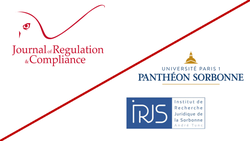
🌐follow Marie-Anne Frison-Roche on LinkedIn
🌐subscribe to the Newsletter MAFR. Regulation, Compliance, Law
🌐subscribe to the Newsletter Surplomb, par MAFR
____
► Full Reference: M.-A. Frison-Roche & G. Loiseau (dir.), Durabilité de l'Internet : le rôle des opérateurs du système des noms de domaine. Compliance et régulation de l'espace numérique (Sustainability of the Internet: the role of the operators of the domain name system. Compliance and regulation of the digital space), Journal of Regulation & Compliance (JoRC) and Institut de Recherche Juridique de la Sorbonne (André Tunc - IRJS), Paris 1 Panthéon-Sorbonne University, 21 Fabruary 2025
____
► General presentation of this symposium: The digital space has been built on and as a system. Its primary interest is of a negative nature: it consists of to be preserved against the prospect of systemic failure, of not collapsing. Like all other systems, this 'Monumental Goal' specific to the digital system justifies resources that incorporate this concern for the future. As with all systems, it integrates and relies on the specific technical nature of this system.
The digital space is largely based on the invention, technology and architecture of domain names. Domain names, as an addressing system, enable users to enter the digital space and find other Internet users. The uniqueness and solidity of the domain name system, entrusted to a single root and decentralisation, makes this community possible for those who use the digital space and ensures the technical durability required, without which the digital space would be compromised.
The architecture, operation, operators and what they do under the control of legislators, regulators, judges and legal subjects are therefore examined from a dual technical and legal perspective, in the light of the imperative of sustainability.
This allows to progress in 4 stages.
Firstly, to examine the permanence in time and space of the domain name system, insofar as it is the foundation of the Internet and the digital system. This technical construction gives rise to legal qualifications, not only for the present but also for the future, since the Web3 offers new technical solutions.
Secondly, this technical sustainability is an imperative that is built into the operators of the domain names themselves, which are inter-linked not only at national level but also at global level, this cross-linking being necessary for the security of the system. The State is present through public law techniques that enable surveillance, control and possible recovery.
Thirdly, it imposes constraints on the operators subject to them in order to serve this monumental goal of technical sustainability, and these constraints themselves generate as many powers as they need to usefully achieve this mission. This proportionality must be at the heart of the method and the requirements. The relationship between constraints and powers also stems from it.
Fourthly, this imperative of technical sustainability, which is global in nature, gives way to imperatives of societal sustainability, more localised in space and time, when domain name operators are called upon by the legitimate authors of binding standards, legislators in the first instance, to express concerns such as the protection of people involved in the digital space and whose rights are compromised or who are in danger.
This second type of sustainability, which is more localised and less inherent in the architecture of the Internet, is justified by the available power of the operators concerned and their adherence to social imperatives. The resulting constraints and powers are therefore not the same.
The 2 sustainabilities must then be articulated in a conception that is both teleological and pragmatic.
____
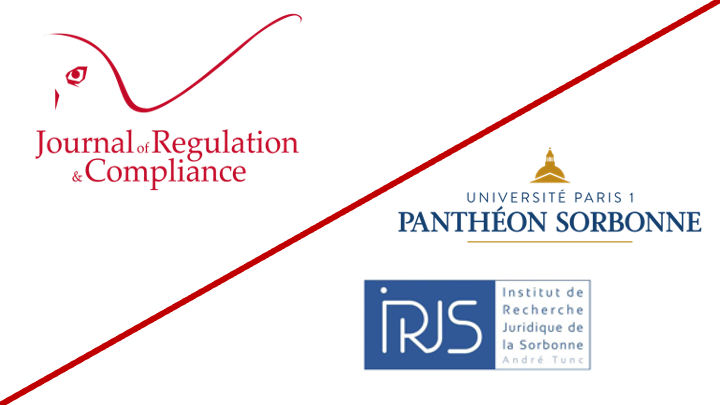
____
► Speakers (they will speak in French, but the book to be published will be in English):
🎤Pierre Bonis, Chief Executive Officer of the Association française pour le nommage Internet en coopération (Afnic)
🎤Lucien Castex, Adviser of the Afnic Chief Executive Officer for Research internet and society and Internet governance
🎤Marie-Anne Frison-Roche, Full Professor of Regulatory and Compliance Law, Director of the Journal of Regulation & Compliance (JoRC)
🎤Claire Leveneur, Senior Lecturer at Paris-Est Créteil University
🎤Grégoire Loiseau, Full Professor at Paris 1 Panthéon-Sorbonne University
🎤Samir Merabet, Full Professor at the University of West Indies
🎤Antoine Oumedjkane, Senior Lecturer at Lille University
🎤Frédéric Sardain, attorney at law, Jeantet law firm
____
read below a detailed presentation of this event⤵️
Dec. 10, 2024
Thesaurus : Doctrine
► Référence complète : Giuliani G. Castellano, " Don’t Call It a Failure: Systemic Risk Governance for Complex Financial Systems", Law & Social Inquiry, vol. 49, n°4, novembre 2024, pp. 2245-2286
____
► Résumé de l'article :
____
🦉Cet article est accessible en texte intégral pour les personnes inscrites aux enseignements de la Professeure Marie-Anne Frison-Roche
________
Sept. 22, 2024
Thesaurus : Doctrine
► Référence complète : Organisation des Nations Unies (ONU), Le Pacte pour l'avenir, 22 septembre 2024, 67 p.
____
________
June 12, 2024
Conferences

🌐follow Marie-Anne Frison-Roche on LinkedIn
🌐subscribe to the Newsletter MAFR Regulation, Compliance, Law
____
► Full Reference: M.-A. Frison-Roche, Participation in the panel "Une Gouvernance responsable : vers un mieux vivre ensemble ?" ("Responsible governance: towards a better way of living together"), in Grenelle du Droit 5. L'avenir de la filière juridique, Association française des juristes d'entreprise ("The future of the legal profession"), AFJE), Cercle Montesquieu and Paris Panthéon-Sorbonne University, Campus Port-Royal Université Paris 1 Panthéon-Sorbonne, 1 rue de la Glacière, 75013 Paris, June 12, 2024
____
🧮See the full programme of this event (in French)
____
🎥watch the interview made just after this round-table discussion (in French)
____
🪑🪑🪑🪑🪑 will also be taking part in this round-table discussion:
🕴️Yves Garagnon, Chairman of Dilitrust,
🕴️Pierrick Le Goff, lawyer, partner at De Gaulle Fleurance,
🕴️Sabine Lochmann, Chairman of Ascend,
🕴️Vincent Vigneau, President of the Commercial, Economic and Financial Chamber of the Cour de cassation (French Judicial Supreme Court)
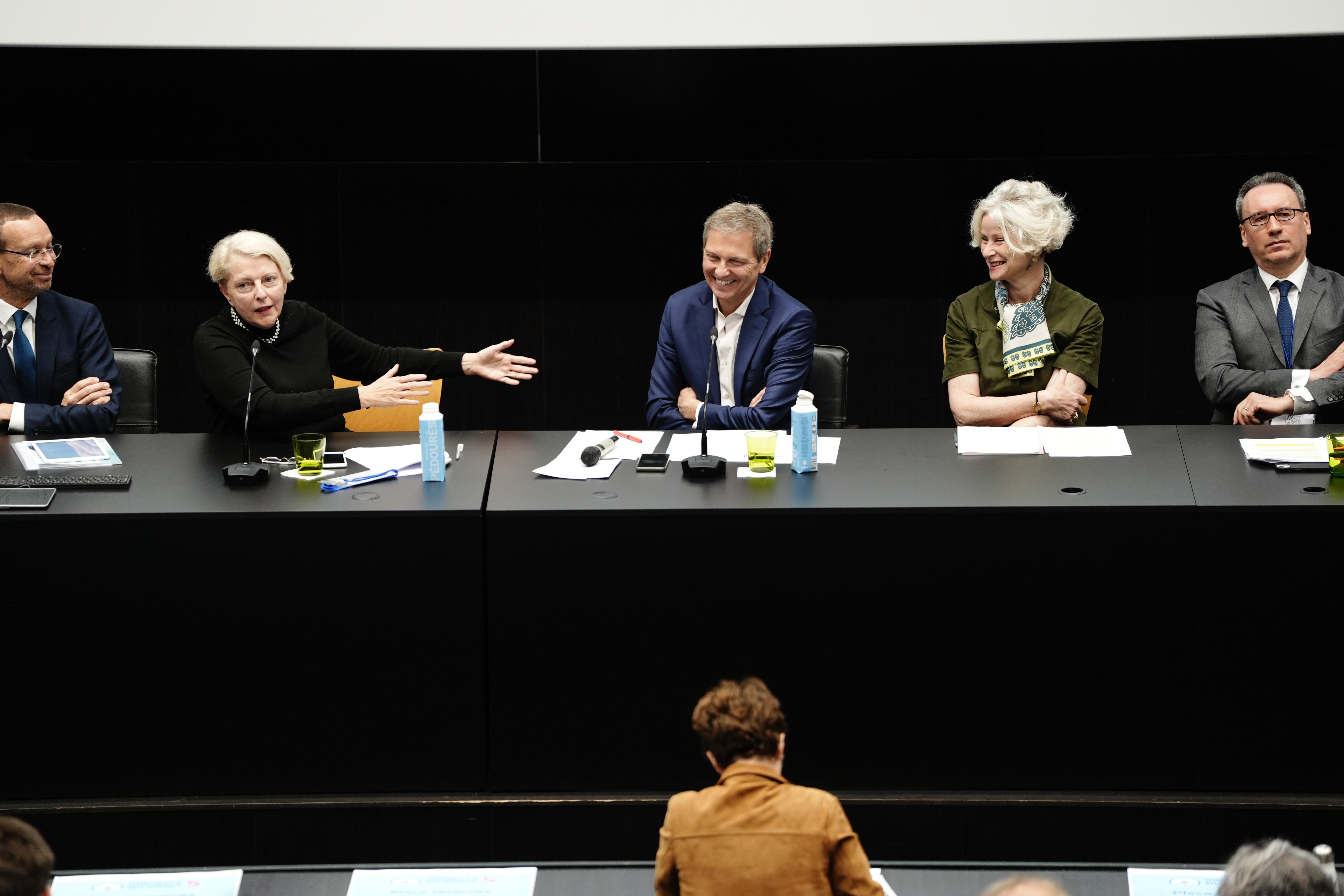
____
► English presentation of my intervention in this event's opening plenary round-table: In this plenary round table which opens the event, devoted to the theme of 'responsible corporate governance', for my interventions based on my work I will have the opportunity to address more particularly these different perspectives:
- How the new Compliance Law, which gives concrete expression to the responsibility of enterprises in a new relationship with States and with civil society, constitutes a 'legal revolution
- 💡for the record, mafr,📝Compliance Law, 2016 ; (ed.) 📘Compliance Monumental Goals, 2022
- how the judgment handed down by the Tribunal judiciaire de Paris (Paris First Instance Civil Court) on 28 February 2023 (Total Ouganda case) is remarkable and already constitutes a turning point in case law
- 💡for the record, mafr, 🎤audition as amica curiae, hearing of 26 October 2022 before the first instance Paris Court; (ed)📘Compliance Jurisdictionalisation, 2024
- how the relationship between States and enterprises is being renewed by this profound legal movement expressed by Compliance Law
- 💡for the record, mafr et M. Boissavy (ed.), 📕Compliance et droits de la défense - Enquêtes internes, CJIP, CRPC, mafr (dir.), 📘 Compliance Obligation, 2025
- how internal lawyers have a decisive and central role to play in this movement, particularly in the mechanism of vigilance / corporate sustainability due diligence, the "cutting edge" of Compliance Law,
- 💡for the record, mafr, 📝Contract of Compliance, Compliance stipulations, 2023 ; (ed.), 📘Compliance and Contract, 2025
- what is meant by the "Ex Ante responsibility" of enterprises, which does not necessarily entail their Ex Post liability, a distinction which lawyers are the guardians of
- 💡for the record, mafr, 📝La responsabilité Ex Ante, pilier du Droit de la Compliance ("Ex-Ante Responsability, Compliance Law Pillar"), 2021
- how European Compliance Law is profoundly humanist, an identity that distinguishes European Compliance from American Compliance and, above all, from Chinese Compliance.
- 💡for the record, mafr (ed.), 📕Pour une Europe de la Compliance ("For the Europe of the Compliance"), 2017
________
read the article about this round table written by Delphine Bauer in Actu-Juridique (in French)
May 29, 2024
Editorial responsibilities : Direction of the collection Compliance & Regulation, JoRC and Bruylant

🌐follow Marie-Anne Frison-Roche on LinkedIn
🌐subscribe to the Newsletter MAFR Regulation, Compliance, Law
____
► Full Reference: M.-A. Frison-Roche (ed.), Compliance Obligation, Journal of Regulation & Compliance (JoRC) and Bruylant, "Compliance & Regulation" Serie, to be published
____
📕In parallel, a book in French L'Obligation de compliance, is published in the collection "Régulations & Compliance" co-published by the Journal of Regulation & Compliance (JoRC) and Dalloz.
____
📚This book is inserted in this series created by Marie-Anne Frison-Roche for developing Compliance Law.
read the presentations of the other books of this Compliance Series:
- further books:
🕴️M.A. Frison-Roche (dir.), 📘Le système probatoire de la compliance, 2025
- previous books:
🕴️M.A. Frison-Roche (ed), 📘Compliance Juridictionnalisation, 2023
🕴️M.A. Frison-Roche (ed), 📘Compliance Monumental Goals, 2022
🕴️M.-A. Frison-Roche (ed.), 📘Compliance Tools, 2021
____
► go to the general presentation of this 📚Series Compliance & Regulation, conceived, founded et managed by Marie-Anne Frison-Roche, co-published par the Journal of Regulation & Compliance (JoRC) and Bruylant.
____
🧮the book follows the cycle of colloquia 2023 organised by the Journal of Regulation & Compliance (JoRC) and its Universities partners.
____
► general presentation of the book: Compliance is sometimes presented as something that cannot be avoided, which is tantamount to seeing it as the legal obligation par excellence, Criminal Law being its most appropriate mode of expression. However, this is not so evident. Moreover, it is becoming difficult to find a unity to the set of compliance tools, encompassing what refers to a moral representation of the world, or even to the cultures specific to each company, Compliance Law only having to produce incentives or translate this ethical movement. The obligation of compliance is therefore difficult to define.
This difficulty to define affecting the obligation of compliance reflects the uncertainty that still affects Compliance Law in which this obligation develops. Indeed, if we were to limit this branch of law to the obligation to "be conform" with the applicable regulations, the obligation would then be located more in these "regulations", the classical branches of Law which are Contract Law and Tort Law organising "Obligations" paradoxically remaining distant from it. In practice, however, it is on the one hand Liability actions that give life to legal requirements, while companies make themselves responsible through commitments, often unilateral, while contracts multiply, the articulation between legal requirements and corporate and contractual organisations ultimately creating a new way of "governing" not only companies but also what is external to them, so that the Monumental Goals, that Compliance Law substantially aims at, are achieved.
The various Compliance Tools illustrate this spectrum of the Compliance Obligation which varies in its intensity and takes many forms, either as an extension of the classic legal instruments, as in the field of information, or in a more novel way through specific instruments, such as whistleblowing or vigilance. The contract, in that it is by nature an Ex-Ante instrument and not very constrained by borders, can then appear as a natural instrument in the compliance system, as is the Judge who is the guarantor of the proper execution of Contract and Tort laws. The relationship between companies, stakeholders and political authorities is thus renewed.
____
🏗️general construction of the book
The book opens with a double Introduction. The first, which is freely accessible, is a summary of the book, while the second, which is substantial, deals with the future development of the compliance obligation in a borderless economic system.
The first part is devoted to the definition of the Compliance Obligation.
The second part presents commitments and contracts, in certain new or classic categories, in particular public contracts, and compliance stipulations, analysed and qualified regarding Compliance Law and the various relevant branches of Law.
The third part develops the responsibilities attached to the compliance obligation.
The fourth part refers to the institutions that are responsible for the effectiveness, efficiency, and efficacy of the compliance obligation, including the judge and the international arbitrator.
The fifth part takes the Obligation or Duty of Vigilance as an illustration of all these considerations.
____
TABLE OF CONTENTS
COMPLIANCE OBLIGATION : OVERVIEW
Section 1 ♦️ Main Aspects of the Book L'Obligation de Compliance, by 🕴️Marie-Anne Frison-Roche
Section 2 ♦️ Conceiving the unicity of the Compliance Obligation without diluting it, by 🕴️Marie-Anne Frison-Roche
TITLE I.
IDENTIFYING THE COMPLIANCE OBLIGATION
CHAPTER I: NATURE OF THE COMPLIANCE OBLIGATION
Section 1 ♦️ Will, Heart and Calculation, the three marks surrounding the Compliance Obligation, by 🕴️Marie-Anne Frison-Roche
Section 2 ♦️ Debt, as the basis of the compliance obligation, by 🕴️Bruno Deffains
Section 3 ♦️ Compliance Obligation and Human Rights, by 🕴️Jean-Baptiste Racine
Section 4 ♦️ Compliance Obligation and changes in Sovereignty and Citizenship, by 🕴️René Sève
CHAPTER II: SPACES OF THE COMPLIANCE OBLIGATION
Section 1 ♦️ Industrial Entities and Compliance Obligation, by 🕴️Etienne Maclouf
Section 2 ♦️ Compliance, Value Chains and Service Economy, by 🕴️Lucien Rapp
Section 3 ♦️ Compliance and conflict of laws. International Law of Vigilance-Conformity, based on recent applications in Europe, by 🕴️Louis d'Avout
TITLE II.
ARTICULATING THE COMPLIANCE OBLIGATION WITH BRANCHES OF LAW
Section 1 ♦️ Constitutional dimensions of the Compliance Obligation, by 🕴️Stéphane Mouton
Section 2 ♦️ Tax Law and Compliance Obligation, by 🕴️Daniel Gutmann
Section 3 ♦️ General Procedural Law, prototype of the Compliance Obligation, by 🕴️Marie-Anne Frison-Roche
Section 4 ♦️ Corporate and Financial Markets Law facing the Compliance Obligation, by 🕴️Anne-Valérie Le Fur
Section 5 ♦️ The Relation between Tort Law and Compliance Obligation, by 🕴️Jean-Sébastien Borghetti
Section 6 ♦️ Environmental and Climate Compliance, by 🕴️Marta Torre-Schaub
Section 7 ♦️ Competition Law and Compliance Law, by 🕴️Jean-Christophe Roda
Section 8 ♦️ The Compliance Obligation in Global Law, by 🕴️Benoît Frydman
Section 9 ♦️ Transformation of Labour Relations and Vigilance Obligation, by 🕴️Stéphane Vernac
Section 11 ♦️ Judge of Insolvency Law and Compliance Obligations, by 🕴️Jean-Baptiste Barbièri
TITLE III.
COMPLIANCE : GIVE AND TAKE THE MEANS TO OBLIGE
CHAPTER I: CONVERGENCE OF SOURCES
Section 1 ♦️ Compliance Obligation, between Will and Consent: obligation upon obligation works, by 🕴️Marie-Anne Frison-Roche
Section 2 ♦️ What a Commitment is, by 🕴️Marie-Anne Frison-Roche
Section 3 ♦️ Cybersecurity and Compliance Obligation, by 🕴️Michel Séjean
Section 4 ♦️ Place of Hope in the Ability to Apprehend the Future, by 🕴️
Section 5 ♦️ Legal Constraint and Company Strategies in Compliance matters, by 🕴️Jean-Philippe Denis & Nathalie Fabbe-Costes
CHAPTER II: INTERNATIONAL ARBITRATION IN SUPPORT OF THE COMPLIANCE OBLIGATION
Section 1 ♦️ Reinforcing Compliance Commitments by referring Ex Ante to International Arbitration, by
Section 2 ♦️ The Arbitral Tribunal's Award in Kind, in support of the Compliance Obligation, by 🕴️Eduardo Silva Romero
Section 3 ♦️ The use of International Arbitration to reinforce the Compliance Obligation: the example of the construction sector, by 🕴️Christophe Lapp & 🕴️Jean-François Guillemin
Section 4 ♦️ The Arbitrator, Judge, Supervisor, Support, by 🕴️Jean-Baptiste Racine
Section 5 ♦️ How International Arbitration can reinforce the Compliance Obligation, by 🕴️Laurent Aynès
TITLE IV.
VIGILANCE, SPEARHEAD OF THE COMPLIANCE OBLIGATION
CHAPTER I: INTENSITIES OF THE VIGILANCE OBLIGATION, SPEARHEAD OF THE COMPLIANCE SYSTEM
Section 1 ♦️ Systemic Articulation between Vigilance, Due Diligence, Conformity and Compliance: Vigilance, Total Share of the Compliance Obligation, by 🕴️Marie-Anne Frison-Roche
Section 2 ♦️ Intensity of the Vigilance Obligation by Sectors: the case of Financial Operators, by 🕴️Anne-Claire Rouaud
Section 3 ♦️ Intensity of the Vigilance Obligation by Sectors: the case of Banking and Insurance Operators, by 🕴️Mathieu Françon
Section 4 ♦️ Intensity of the Vigilance Obligation by Sectors: the case of Digital Operators, by 🕴️Grégoire Loiseau
Section 5 ♦️ Intensity of the Vigilance Obligation by Sectors: the case of Energy Operators, by 🕴️Marie Lamoureux
CHAPTER II: VARIATIONS OF TENSIONS GENERATED BY THE VIGILANCE OBLIGATION, SPEARHEAD OF THE COMPLIANCE SYSTEM
Section 1 ♦️ Rethinking the Concept of Civil Liability in the light of the Duty of Vigilance, Spearhead of Compliance, by 🕴️Mustapha Mekki
Section 2 ♦️ The transformation of governance and due diligence, by 🕴️Véronique Magnier
Section 3 ♦️ Technologies available, prescribed or prohibited to meet Compliance and Vigilance requirements, by 🕴️Emmanuel Netter
CHAPTER III: NEW MODALITIES OF THE COMPLIANCE OBLIGATION, HIGHLIGHTED BY THE VIGILANCE IMPERATIVE
Section 1 ♦️ How the Vigilance Imperative fits in with International Legal Rules, by 🕴️Bernard Haftel
Section 2 ♦️ Contracts and clauses, implementation and modalities of the Vigilance Obligation, by 🕴️Gilles J. Martin
Section 3 ♦️ Proof that Vigilance has been properly carried out with regard to the Compliance Evidence System, by 🕴️Jean-Christophe Roda
TITLE V.
THE JUDGE AND THE COMPLIANCE OBLIGATION
Section 1 ♦️ Present and Future Challenges of Articulating Principles of Civil and Commercial Procedure with the Logic of Compliance, by 🕴️Thibault Goujon-Bethan
Section 2 ♦️ Mediation, the way forward for an Effective Compliance Obligation, by 🕴️Malik Chapuis
Section 3 ♦️ The Judge required for an Effective Compliance Obligation, by 🕴️Marie-Anne Frison-Roche
________
May 22, 2024
Thesaurus : Doctrine
► Référence complète : M. Mueller, The Myth of AGI. How the illusion of Artificial General Intelligence distorts and distracts digital governance, Internet Governance Project (IGP) White Paper, n°11, mai 2024, 20 p.
____
► Résumé de l'article (fait par l'auteur) : "The claim that Artificial General Intelligence (AGI) poses a risk of human extinction is largely responsible for the urgency surrounding AI governance. This paper reviews and critically evaluates the AGI-related literature in computer science, economics and philosophy to understand the assumptions and logic underlying claims that AI can threaten human survival. The review identifies three inter-related fallacies underlying AGI doomer scenarios: a) the idea that a machine can have a “general intelligence;” b) anthropomorphism, or the attribution of autonomous goals, desires and self-preservation motives to human-built machines; and c) the assumption that the superior calculating intelligence of an AGI will give it unlimited power over physical resources and social institutions. The paper characterizes these assumptions as unrealistic and exposes the lack of logic and empirical evidence in the doomer scenarios. Evaluating the AGI construct is important from a public policy perspective because of the myth's enormous influence on the way governments, industry and the public approach digital governance. The idea of an all-powerful autonomous AGI misdirects policy interventions toward precautionary regulation of the design or production of all AI applications, while diverting our attention from more mundane, yet realistic risks posed by specific AI uses and users. The myth of existential risk also encourages governments to attempt to assert control over the entire digital ecosystem in ways that stifle competition and innovation and centralize power.".
____
🦉Cet article est accessible en texte intégral pour les personnes inscrites aux enseignements de la Professeure Marie-Anne Frison-Roche
________
April 30, 2024
Thesaurus : Doctrine
► Référence complète : NETmundial+10, Déclaration multipartite NETmundial+10. Renforcement des processus de gouvernance de l’Internet et de politique numérique, 30 avril 2024, 20 p.
____
________
Feb. 24, 2024
Interviews
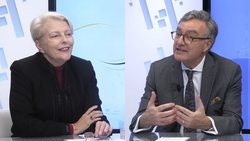
► Full reference: J. Beyssade, "Compliance et gouvernance (exemple d'un groupe bancaire)" (Compliance and governance (example of a banking group)), interview conducted by M.-A. Frison-Roche on the occasion of a series of interviews on Compliance Law, in Fenêtres ouvertes sur la gestion (Open windows on management), broadcast by J.-Ph. Denis, Xerfi Canal, recorded December 12, 2023, recorded February 24, 2024
____
🌐consult the presentation of Jacques Beyssade's interview on LinkedIn
____
🎥view the full interview on Xerfi Canal
____
► Starting point: In 2022, Jacques Beyssade wrote a contribution on 📝Feminisation of positions of responsibility in the workplace as a goal of Compliance, in 📘Compliance Monumental Goals
🧱read the presentation of this contribution ➡️click HERE
____
► Summary of interview:
Marie-Anne Frison-Roche. Question: Compliance and governance are often linked. Can you explain how, in the strategy of a banking group like BPCE, this link between compliance and governance is articulated?
Jacques Beyssade. Answer. Compliance is not just a matter of obeying the rules, but also, and perhaps even more so, of respecting customers, suppliers, stakeholders and members. For a mutualist structure, customers and member-policyholders are closer, they are the same social body, and so it's a matter of governance.
____
MaFR. Q.: Let's take a concrete example, where Compliance and governance serve a specific purpose: effective equality between men and women, for example. How does this work in your Group?
J.B. R.: This objective is in the genes of BPCE, and in particular of the savings banks. The Copé-Zimmermann law requires it. We go beyond this constraint, at the level of governance. The management board, or executive committee, is egalitarian, and this also works as an example. Compliance takes up the baton, for example, by identifying talent, particularly female talent, and correcting any anomalies.
____
MaFR. Q.: In the future, can we hope that this alliance between new governance and the power of Compliance, with the same Monumental Goals, will transform our societies?
J.B. R.: Changes in society come from the behavior of individuals and companies, as demonstrated by the opening of savings accounts to women in the 19th century. Both can do a great deal, within the framework of regulations, by going beyond them. Through governance, for example in a mutual bank like BPCE, it's the members who set the rules, reflecting social movements because they themselves are representative of society as a whole. In this way, through the alliance of governance and compliance, they can act to give concrete expression to the fundamental social movements they themselves represent, through the broad representation of the social body that the member-policyholders constitute.
________
Jan. 24, 2024
Thesaurus : Doctrine

► Référence complète : M. Caffin-Moi, "Les femmes dans les instances de direction des sociétés", in J. Houssier & M. Saulier (dir.), Les femmes et le droit. Les discriminations invisibles, Dalloz, coll. "Thèmes & Commentaires", 2024, pp. 111-122
____
► Résumé de l'article :
____
🦉Cet article est accessible en texte intégral pour les personnes inscrites aux enseignements de la Professeure Marie-Anne Frison-Roche
________
Jan. 4, 2024
Thesaurus : Doctrine
► Référence complète : V. Lasserre, "Les sources textuelles internes et européennes du droit des affaires. L'exemple du devoir de vigilance", JCP E, n° 1, 4 janvier 2024, étude n° 1002, pp. 23-27
____
► Résumé de l'article (fait par l'auteure) : "Comprendre la loi sur le devoir de vigilance est utile. Premièrement, parce que ce devoir est un modèle qui tend à être diffusé. Poursuivant dans le sillon du législateur français, le législateur européen est également en train de construire un cadre européen pour le devoir de vigilance des entreprises. Deuxièmement, parce que de nombreuses actions en justice ont été intentées, montrant la vita- lité de ce devoir. Troisièmement, parce que ce devoir est un moment clé dans le développement de la responsabilité sociale et environnementale des entreprises. On démontrera que des sources hétéroclites ont concouru à forger le devoir de vigilance et que les mots de la loi oscillent entre rupture et continuité.".
____
🦉Cet article est accessible en texte intégral pour les personnes inscrites aux enseignements de la Professeure Marie-Anne Frison-Roche
________
Dec. 12, 2023
Conferences

► Référence complète : M.-A. Frison-Roche, enregistrement et animation d'une série d'entretiens sur le Droit de la Compliance, in J.-Ph. Denis, Fenêtres ouvertes sur la gestion, Xerfi Canal, tenus le 12 décembre 2023, diffusés en 2024.
____
► Présentation générale de la série, comprenant les entretiens successifs : 🧱Compliance - un sujet de choix pour nouer Droit et Gestion : La distinction des disciplines est justifiée, le droit d'une part, la gestion d'autre part : c'est maltraiter la réalité que, notamment, de dissoudre l'une dans l'autre (ce que Jankélévitch appelait "la réduction par déplacement d'une discipline") car chacune doit conserver son ancrage.
Ceci posé, parce que la réalité ne se construit suivant les disciplines, si l'on veut rendre compte de celle-ci, ou au moins en tenir compte, par exemple de la réalité des entreprises, il faut que les disciplines se croisent.
La compliance est un parfait terrain pour cela.
Merci à Jean-Philippe Denis, professeur de gestion, qui est depuis toujours ouvert à ce dialogue, de l'avoir concrétisé plus encore, en permettant une série d'interviews à la croisée du Droit et de la Gestion sur le média Xerfi Canal.
____
Dans un premier temps, 4 discussions ont été tenues entre Jean-Philippe Denis et moi-même sur les thèmes suivants :
- 🎬sur la nécessité pratique de faire converger l'analyse juridique et l'analyse de gestionnaire lorsqu'il s'agit de comprendre, maîtriser, promouvoir la compliance (diffusé le 23 septembre 2024) : cliquer ICI
- 🎬sur l'existence de différents systèmes de compliance selon les zones du mondes
- 🎬sur la "civilisation" de la Compliance
- 🎬sur le fait que la Vigilance est la pointe avancée de la Compliance (diffusé le 13 juin 2024) : cliquer ICI
Puis, dans un second temps
- 🎬avec 🕴️Jean-Baptiste Racine sur la manière dont l'arbitrage international est apte aujourd'hui à défendre les Buts Monumentaux de la Compliance, notamment les droits humains et les impératifs environnementaux.
- 🎬avec 🕴️Stanislas Pottier de la façon dont les entreprises intègrent cet impératif de compliance, notamment dans sa dimension environnementale, participent à la construction européenne par cette voie, et arrivent à faire connaissance avec ce personnage assez nouveau pour elle, au moins en France : le juge (diffusé le 27 avril 2024) : cliquer ICI
- 🎬 avec 🕴️Roch-Olivier Maistre du rôle que joue l'Arcom dans le nouveau système numérique qui se met en place, et quelle articulation se noue entre la Régulation et la Compliance, notamment pour mesurer en quoi la Compliance est un outil utile pour assurer une meilleure supervision des plateformes en ligne et lutter ainsi plus efficacement contre les phénomènes de manipulation de l’information et de haine en ligne (diffusé le 16 mars 2024) : cliquer ICI
- 🎬avec 🕴️Eduardo Silva-Romero de l'importance grandissante de l'arbitrage international pour les entreprises, arbitrage qui intègre les intérêts des États et répond aux impératifs de Compliance (diffusé le 27 avril 2024) : cliquer ICI
- 🎬avec 🕴️Christophe Lapp de la nécessité pratique de ne pas confondre la Compliance avec la simple conformité, notamment lorsque le juge est saisi, les Buts Monumentaux étant intégrés dans son raisonnement (diffusé le 3 février 2024) : cliquer ICI
- 🎬avec 🕴️Jacques Beyssade du rapport entre la gouvernance et la Compliance, illustré dans une banque mutualiste et plus particulièrement dans le recrutement et la promotion des femmes à des postes de responsabilité (diffusé le 24 février 2024) : cliquer ICI
____
____
🔓consulter ci-dessous une présentation de chaque interview mené avec un expert en Droit sur un sujet particulier de Droit de la Compliance⤵️
March 23, 2023
Thesaurus : Doctrine

► Référence complète : V. Magnier, Déontologie et éthique de l'entreprise, PUF, coll. "Droit & Déontologie", 2023, 260 p.
____
📗lire la 4ième de couverture de l'ouvrage
____
📗lire la table des matières de l'ouvrage
____
► Résumé de l'ouvrage (fait par l'éditeur) : "La déontologie et l'éthique d'entreprise naissent de sources éparses, embrassent un large champ thématique et s'étendent à de nombreux acteurs.
Le conflit d'intérêts est au coeur des préoccupations déontologiques de l'entreprise, comme en témoignent les procédures pesant sur ses acteurs-clés, dirigeants et actionnaires de référence. Les bonnes pratiques de gouvernance, inspirées des théories sur la gouvernance d'entreprise, se muent aussi en règles déontologiques consignées dans les codes de gouvernance. L'entourage des actionnaires n'est pas épargné, notamment les agences de conseil en vote sur qui pèsent des règles déontologiques.
L'éthique d'entreprise est aussi en plein essor. On distingue l'éthique de la transparence, celle des compliances et celle de la vigilance. Ces nouvelles normes éthiques suscitent de fortes attentes, notamment au regard des préoccupations sociétales, environnementales, de la défense des droits de l'homme ou de la lutte contre la corruption.".
Oct. 12, 2022
Conferences

♾️ follow Marie-Anne Frison-Roche on LinkedIn
♾️subscribe to the Newsletter MAFR Regulation, Compliance, Law
____
 ► Full Reference: Frison-Roche, M.A., La compliance en entreprise : aspects théoriques et pratiques, in 118ième Congrès des Notaires, L'ingénierie notariale, Marseilles, October 12, 2022.
► Full Reference: Frison-Roche, M.A., La compliance en entreprise : aspects théoriques et pratiques, in 118ième Congrès des Notaires, L'ingénierie notariale, Marseilles, October 12, 2022.
This Masterclass is given in French.
____
► English Presentation of this Masterclass: This two-hour Masterclass aims to introduce, regarding the role of the Notary in companies and vis-à-vis them, Compliance Law.
This discover of Compliance Law is built on a description of the new Compliance techniques of which companies are the object or the source (I) then, faced with such a mass of new standards, because this is incomprehensible and uncontrollable if these so many regulations are not "conceived", explain what can give meaning to this Compliance Law, namely the "Monumental Goals" which animate it and give it meaning (II). Like the Regulation Law that Compliance prolongs, Compliance Law is a teleological branch of law that requires that the application and interpretation of norms be done by these Monumental Goals.
____
This Masterclass is given in French: see some technical references in English ⤵️
Sept. 1, 2022
Thesaurus : Doctrine

► Full Reference: A.-V. Le Fur, "Intérêt et raison d’être de l’entreprise : quelle articulation avec les buts monumentaux de la compliance ?" ("Interest and “raison d’être” of the company: how do they fit with the Compliance Monumental Goals?"), in M.-A. Frison-Roche (ed.), Les Buts Monumentaux de la Compliance, coll. "Régulations & Compliance", Journal of Regulation & Compliance (JoRC) and Dalloz, p. 55-67.
____
📕read a general presentation of the book, Les Buts Monumentaux de la Compliance, in which this article is published
____
► Summary of the article (done by the Author): Companies would have a soul. The legislator thinks so, since the French law called "loi Pacte" of 22 May 2019 obliges managers to act in the Corporate Interest and allows companies to formulate themselves a « raison d'être ». Compliance Law does the same, relying on companies to save the world from corruption, slavery, terrorism and global warming, thus achieving Monumental goals.
At first glance, the contours of Corporate Interest and « raison d’être » of the company are not far removed from the notion of Compliance Monumental Goals. This is not surprising, since the objective that presided over their introduction into the French Civil Code is the same as that underlying Compliance Law : to rethink the place of the company in the global Society, by affirming long-term values or concerns. This is a reason to use these corporate law concepts in the context of an X-ray of the concept of Monumental Goals.
However, a comparative approach is disappointing. The divergences between corporate notions and compliance lead to the conclusion that company law is not intended to impose anything other than a corporate public order. Notions that are more philosophical than legal, Corporate Interest and « raison d'être » are assigned functions that limit their scope. The imperative nature of corporate rules, and this is a consequence of the above, cannot be compared with that of compliance: uncertain, it is also relative when compared with the "violence" of compliance rules. The impact of the notions of Interest and « raison d'être » remains thus mainly internal to the company.
According to a second approach, it cannot be ruled out that Corporate Interest and « raison d'être » allow for a better understanding of higher and universal values by Company Law. Corporate Interest may incorporate Compliance Monumental Goals while the « raison d'être » may constitute a perspective for the realization of these goals.
The stakes are high : when the interest of the company, as a legal person and autonomous economic agent, joins the Monumental Goals, the means of achieving the latter are multiplied by internalizing them in all companies, not just the largest ones. However, despite all good intentions, a company is only governable if the compass does not become an elusive and indecisive vane; in other words, if legal certainty is respected. This is why a legal ordering of the concepts is necessary, which ultimately leads to a suggestion of their domain, content and scope.
________
Aug. 12, 2022
Compliance: at the moment
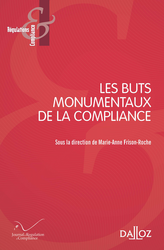
|
March 24, 2022
Interviews

► Full Reference: Frison-Roche, M.A.,, "Faire du Droit pour qu'à l'avenir le monde soit moins injuste" - à propos du projet de directive européenne sur le devoir de vigilance ("Making Compliance Law for a world less unfair in the future" - about the draft European directive on the corporate sustainability due diligence), interview with Olivia Dufour, Actu-Juridique, March 24, 2022.
____
💬 read the interview (in French)
___
► Interview English Summary: This interview comments on the draft directive presented by the European Commission aimed at unifying European Union Law about Corporate Sustainability Due diligence in global supply chains to protect environnement and human rights effectively, putting companies under same legal rules. including non-European companies.
The interview emphasizes that this text and reinforces Compliance Law perspective in that the legal instruments are Ex Ante, aim at the functioning of groups, constitute incentives, and seek effectiveness to prevent violations of human rights and the environment, 80% of which taking place outside the European Union.
The goal is both ethical, for example to fight against child labor and the endangerment of people, and systemic: the promoting of a sustainable economy, through the help of companies which have some power in value chains which are global.
This future directive clearly shows the difference between simple "conformity" (just obeying all applicable regulations...) and "compliance", illustrated here: aiming to achieve "monumental goals", here fighting against attacks on the climate balance and protect people, to obtain in the future these damages do not occur or are reduced.
________
March 16, 2021
Compliance: at the moment
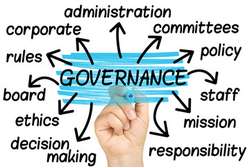
Feb. 2, 2021
Thesaurus : Doctrine
► Référence complète : T. Sachs, J. Tricot, "La loi sur le devoir de vigilance : un modèle pour (re)penser la responsabilité des entreprises", Droit & Société, n° 106, 2020, p. 683-698.
____
► Résumé de l'article (fait par les auteurs) : Grâce à une ingénierie juridique très sophistiquée, les entreprises multinationales se jouent des frontières entre sociétés commerciales et entre États, parvenant ainsi à échapper à toute responsabilité. L’impuissance des États, qui devraient alors déléguer aux acteurs eux-mêmes le soin de développer des instruments de responsabilité sociale des entreprises, est-elle une fatalité ? Alors que certains voudraient confier la fabrication des normes de gouvernance aux acteurs, la loi sur le devoir de vigilance pourrait constituer un modèle d’une articulation originale et équilibrée entre hétéronomie et autonomie normative. Cet article entend mettre en lumière les caractéristiques de ce modèle, au moyen d’une confrontation de la loi sur le devoir de vigilance avec la loi Sapin 2 qui se présente comme son pendant tout en mobilisant d’autres leviers, ceux de la compliance.
____
🗒️Les étudiants inscrits au cours de Marie-Anne Frison-Roche peuvent accéder au texte de ces articles.
________